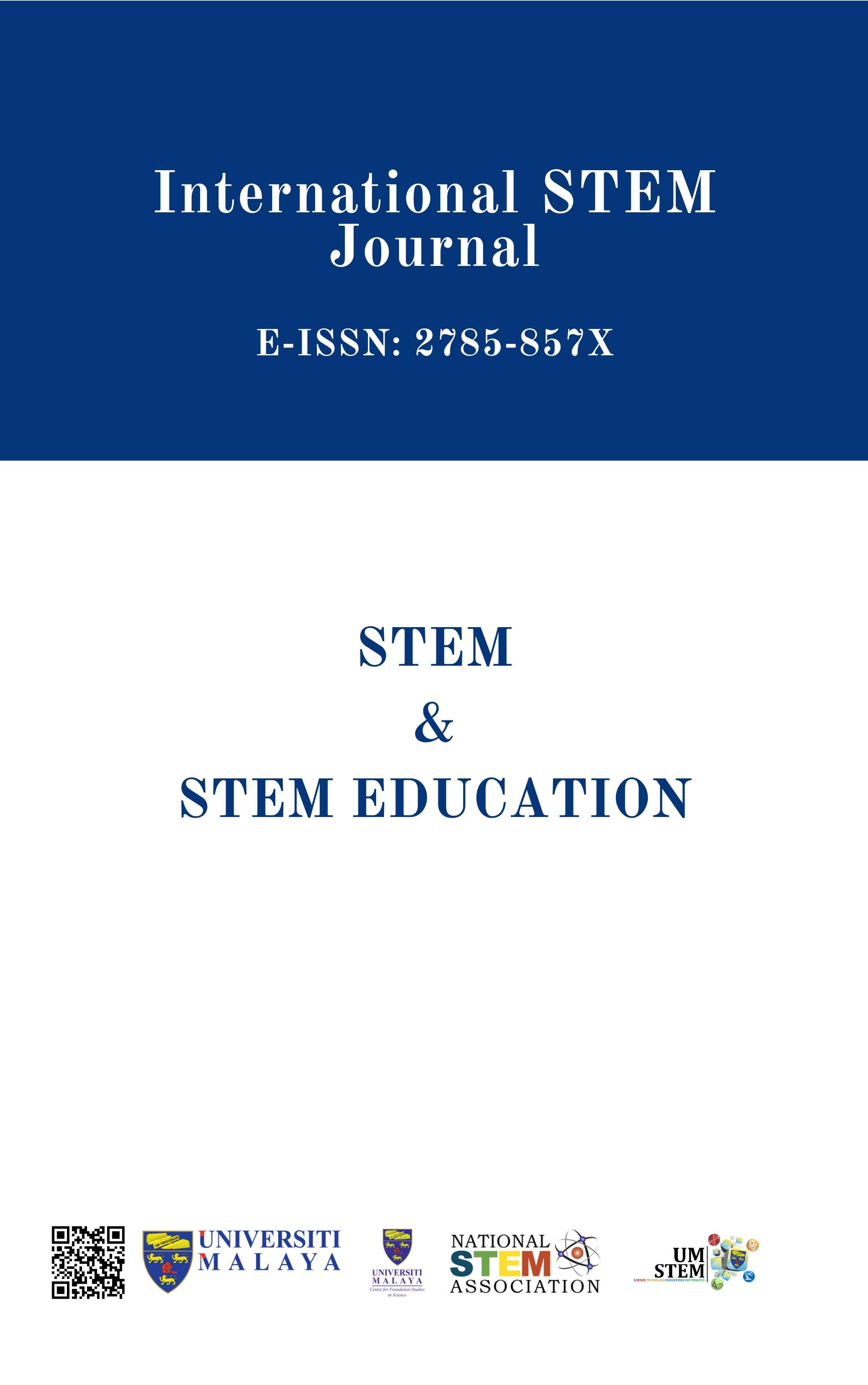Early Mathematics Module for Stem Learning with Flipped Classroom Concept Using Augmented Reality
Keywords:
Flipped Classroom, Augmented Reality, Early Mathematics, patterns, Fuzzy DelphiAbstract
Early Mathematics is one of the critical subjects and the concept of learning should be introduced to students at an early stage so that there is no misunderstanding of the concept of this subject. Beginning in the 1970s, teaching methods have traditionally been more focused on the memorization of Mathematical concepts. This research aims to increase students' understanding of pattern topics in the subject of Early Mathematics by integrating the concept of Flipped classrooms with an Augmented Reality application known as the EM-Flip module. This research was conducted using a combination of the ADDIE model (Analyze, Design, Development, Implementation, and Evaluation) and DDR (Design and Development Research) techniques. In the first phase, open-ended questionnaire items were distributed to 60 TADIKA teachers and 60 parents. Document analysis of 25 students was carried out in TADIKA. The Delphi Fuzzy Technique was implemented in the second phase, involving 10 experts including early childhood experts, curriculum experts, ICT, Flipped Classroom experts, policymakers, theorists, and Early Mathematics experts. In the third phase, the TUP model from Bednarik was implemented to evaluate the usability and effectiveness of the modules. The findings of the study found that students were more engaged and showed their interest in class when they were given more opportunities to actively engage with the teacher. In addition to active learning in the classroom, the combination of technology also plays an important role in the flow of current learning methods.
Downloads
References
Dina Julita and Rudi Susilana. (2018). Implementasi Kurikulum Montessori Bernafaskan Islam Pada Pendidikan Anak Usia Dini Rumah Bermain Padi Di Kota Bandung. Pusat Pengembangan PAUD & Pendidikan Masyarakat Jawa Barat dan Universitas Pendidikan Indonesia.
Dina Tirosh, Pessia Tsamir, Ruthi Barkai and Esther Levenson. (2017). Preschool Teachers’ Variations When Implementing A Patterning Task. CERME 10, Feb 2017, Dublin, Ireland. ffhal-01938920.
Doig, B. and Ompok, C. (2010). Assessing Child Informal Mathematic Abilities Through Games. Mathematics In Early Childhood. Procedia-Social and Behavioral Sciences, 8, 228-235.
Donna Kotsopoulos, Lisa Floyd, Vivian Nelson and Samantha Makosz. (2019). Mathematical or Computational Thinking? An Early Years Perspective (n.d.). Retrieved February 28, 2021, from https://www.researchgate.net/publication/332926976_Mathematical_or_Computational_Thinking_An_Early_Years_Perspective
Erten, .H. and M. Williams. (2008). A Comparative Look Into How To Measure The Effectiveness Of Vocabulary Learning Strategies: Through Using Percentages Or Correlation Coefficients. Journal Of Language And Linguistic Studies, 4(2): 1-17.
Erten, .H. and M. Williams. (2008). A Comparative Look Into How To Measure The Effectiveness Of Vocabulary Learning Strategies: Through Using Percentages Or Correlation Coefficients. Journal Of Language And Linguistic Studies, 4(2): 1-17.
Eshak, Z. and Zain, A. (2020). Kaedah Fuzzy Delphi: Reka Bentuk Pembangunan Modul Seksualiti Pekasa Berasaskan Latihan Mempertahankan Diri Untuk Prasekolah. Jurnal Pendidikan Awal Kanak-Kanak Kebangsaan, 9(2), 12-22. https://doi.org/10.37134/jpak.vol9.2.2.2020
Hafiz, Zawawi dan Zaharah. (2017). Penggubalan Dan Pengesahan Standard Kualiti Pendidikan Tahfiz Al-Quran Menggunakan Aplikasi Fuzzy Delphi Method. Simposium Pendidikan diPeribadikan: Perspektif Risalah An-Nur (SPRiN2017)
Hunting, R., Mousley, J. and Perry, B. (2012). Young Children Learning Mathematics: A Guide For Educators And Families. Melbourne, Vic.: ACER press.Perry, MacDonald, Amy, Gervasonni, Ann, 2015).
Ibrahim, R., Mohd Yasin, M. H., Ibrahim, R. and Abdullah, N. (2020). Indikator Sokongan Pembelajaran Dalam Reka Bentuk Flipped Classroom Bagi Murid Bermasalah Pembelajaran Berdasarkan Kesepakatan Pakar. Jurnal Pendidikan Awal Kanak-Kanak Kebangsaan, 9(2), 23-33. https://doi.org/10.37134/jpak.vol9.2.3.2020
Izwan Nurli Mat Bistaman et. al. (2018). The Use of Augmented Reality Technology for Primary School Education in Perlis, Malaysia. J. Phys.: Conf. Ser. 1019 012064
Jabatan Perancangan Bandar dan Desa. (2017). Garis Panduan Perancangan Dan Penubuhan TADIKA Dan Taska 2017. Kementerian Kesejahteraan Bandar, Perumahan dan Kerajaan Tempatan.
Kassim, Nooriza and Zakaria, Effandi. (2015). Integrasi Kemahiran Berfikir Aras Tinggi Dalam Pengajaran Dan Pembelajaran Matematik: Analisis Keperluan Guru. Conference: Prosiding Seminar Education Graduate Regional Conference (EGRC 2015).
Nguyen, T., Watts, T. W., Duncan, G. J., Clements, D. H., Sarama, J. S., Wolfe, C. and Spitler, M. E. (2016). Which Preschool Mathematics Competencies Are Most Predictive Of Fifth Grade Achievement? Early Childhood Research Quarterly, 36, 550-560. doi:10.1016/j.ecresq.2016.02.003
Niko Myller and Roman Bednarik. (2014). Methodologies For Studies Of Program Visualization Department of Computer Science University of Joensuu PO Box 111, FI-80101
Norabeerah Saforrudin, Halimah Badioze Zaman and Azlina Ahmad. (2012). Future Teaching Using Augmented Reality In Malay Language Classroom: Teachers' Awareness. , ISSN: 2180-4842. Vol. 2, Bil. 2 (Nov. 2012): 1-10 1 Jurnal Pendidikan Bahasa Melayu – JPBM
Nurhusna Abdul Malek. (2017). Penglibatan Ibubapa Dalam Perkembangan Holistic Kanak-Kanak Ditaska Permata Kemas – Universiti Perguruan Sultan Idris, Tangjung Malim, Perak
Papic, MM, Mulligan, JT, Highfield, K, McKay-Tempest, J and Garrett, D. (2015). The Impact Of A Patterns And Early Algebra Program On Children In Transition To School In Australian Indigenous Communities. in B Perry, A MacDonald & A Gervasoni (eds), Mathematics and transition to school: international perspectives.
Ratchel Lechmann et.al. (2016). Twenty-First Century Early Childhood Teaching, Learning and Play, An Online Journal for Literacy Educators.
Richey dan Klein. (2007). Developmental Research: Studies of Instructional Design And Development.
Sharifah Norul Akmar Syed Zamri dan Nor Adlina Mohd. (2014). Kesediaan Kanak-kanak Prasekolah Mengecam Pola Matematik (Preschoolers’ Readiness in Recognizing Mathematical Patterns) Jurnal Pendidikan Malaysia 39(1)(2014): 63-68.



